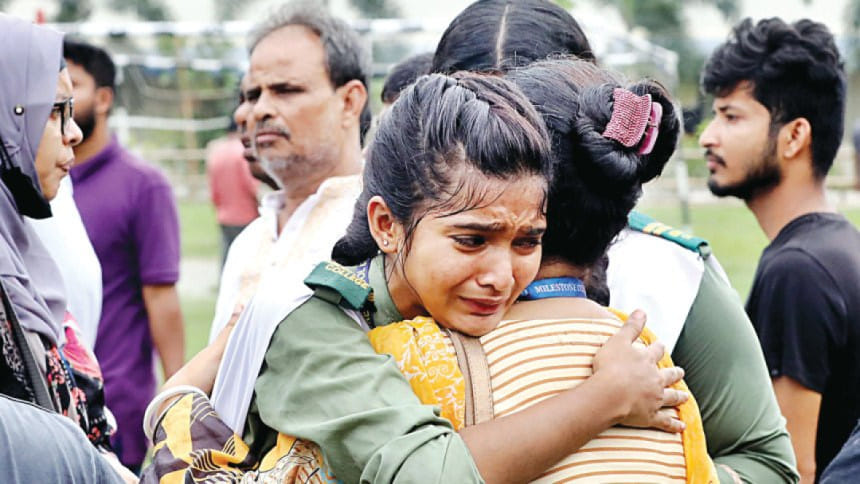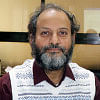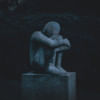A path to trauma healing for Milestone survivors

Initially, the father of two students of Milestone School and College was not feeling comfortable talking with me. Perhaps he was forced to put himself under self-embargo due to the meaningless inquiries from a group of "news hunters." He was in his office when the incident happened. He rushed to the location to learn that both his sons were unharmed. The older one, a 10th-grader, was at home, but the younger one was at school that day.
After assuring him that I wouldn't reveal his name to anyone, the father began to share. "My younger boy has been extremely frightened ever since the incident. He was stuck in a room adjacent to the Hyder Ali Building where the plane crashed," he said. "He used to not talk much to begin with; now he speaks even less. And he gets anxious whenever the topic of going to school comes up."
The school authority, with the help of Bangladesh Air Force, Directorate General of Health Services (DGHS), National Institute of Mental Health (NIMH) and Hospital, and BRAC, opened medical camps and mental health services on the campus.
On July 28, a week after that terrible afternoon, I went to the crash site and saw parents picking up their children's school bags. The bags were stacked in rows in a room of a single-storey building. The stack created a gloomy sculpture. Every bag had a story. A sheet of paper with the pupil's name, roll number, class, and branch written on it was attached to each bag. One black bag stuck out among the others. It was badly burnt in the fire.
The snooping mob was still there. A few of them were filming and taking photos. An air force delegation reached the crash site at around 10 in the morning. They gathered some evidence and debris. Many students who came to avail medical services at the campus with their parents seemed visibly scared and wanted to leave right away.
"I've been to the medical camp three times since the incident," a fifth-grader informed me. "Every time I enter the campus, my heart races and I can hear the loud sound of the plane," he said. The sound of the jets and planes became intolerable to him. Another girl from the same class joined him, "Every time I hear the sound of an aeroplane, I feel like I'm about to get hit and feel the urge to flee."
I met a survivor whose ears were hurt in the incident. His ears were still swollen, and his face and hands had burn marks. He was examined by the camp doctors and offered medication and advice. According to the health aid provider, he was going to be taken to the Combined Military Hospital (CMH) if necessary.
I came across three pupils who were grieving the loss of their best friends. One of them said he went to the cafeteria to eat something and bring food for his friend just before the plane crashed. The incident claimed the life of his friend.
Another student who lost two friends now gets frightened every time he hears a plane fly over their house. In his dreams, the deceased buddies visit every night.
This kind of trauma cannot be treated with medication. The attending physician from the camp suggested that parents must encourage their children to play with friends rather than being alone. The doctor also suggested that the parents take their children out. These steps aid in the healing process. It is important to remember that not all traumatised children need professional counselling or clinical treatment, but all of them require assistance from their parents and others around them. Having a supportive network of family, friends and teachers, as well as reassurance and open communication can help many kids recover from traumatic events. However, clinical assistance such as trauma-focused therapy could be required if a child's symptoms have a substantial influence on their everyday functioning, mental health, or quality of life.
Instead of conventional class activities, children should spend more time engaging in age-appropriate games and creative art. Playing is an effective healing strategy for traumatised kids because it offers a fun and safe space for resolving feelings and developing resilience. Children can rebuild healthy relationships, examine their vulnerabilities, and learn coping skills at their own pace with play therapy. Those who may find it difficult to vocally communicate complicated emotions associated with trauma might be able to do so through play.
Games can be designed with the assistance of child psychologists to teach coping skills like emotional control, problem-solving methods, and relaxing techniques. Additionally, via play, kids can gain a sense of mastery, control, and self-worth—all of which are essential for fostering resilience in the face of hardship. Through play with classmates and caregivers, traumatised children can lessen feelings of loneliness, develop a sense of belonging, and re-establish social ties.
Children must return to school because it will aid in the process of restarting "life as usual." Initially, the focus should be on socialising, playing games, singing, painting, and conversing with friends rather than typical academic pursuits. They can progressively re-enter the demanding job of studying and taking tests, etc once these activities have helped settle their thoughts. Additionally, parents ought to be able to visit the school whenever they choose. In a variety of ways, they (parents and caregivers) should also receive emotional support.
Gawher Nayeem Wahra is a writer, disaster management expert, and child rights advocate. He can be reached at [email protected].
Views expressed in this article are the author's own.
Follow The Daily Star Opinion on Facebook for the latest opinions, commentaries and analyses by experts and professionals. To contribute your article or letter to The Daily Star Opinion, see our guidelines for submission.

 For all latest news, follow The Daily Star's Google News channel.
For all latest news, follow The Daily Star's Google News channel. 





Comments